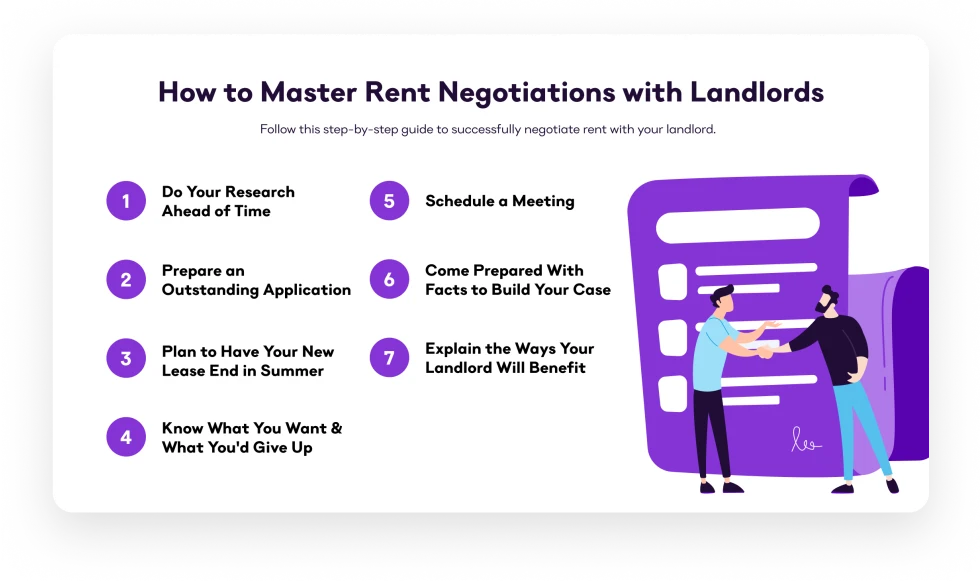With Miami’s rental prices remaining high, many tenants are looking for ways to cut costs and secure better lease terms. Negotiating rent may seem intimidating, but landlords often have flexibility—especially in a competitive rental market. Whether you’re signing a new lease or renewing your current one, this guide will help you negotiate your rent and save money in Miami.
1. Can You Negotiate Rent in Miami?
Yes! Many landlords are open to negotiation, especially if the rental market has softened or the unit has been vacant for a while. While corporate-managed buildings may have stricter policies, private landlords and individual property owners are often more flexible.
When Do Landlords Consider Rent Negotiations?
✔ If the unit has been vacant for a while – Landlords prefer occupancy over waiting for a tenant to pay full price.
✔ If you’re a great tenant – Strong rental history, on-time payments, and long-term interest can work in your favor.
✔ During the off-season – Miami’s rental market slows down in late summer and early fall, making landlords more willing to negotiate.
✔ If you’re signing a longer lease – Some landlords offer discounts for 18-month or 2-year leases.
2. How to Prepare for Rent Negotiation
Before reaching out to your landlord, gather the right information to strengthen your case.
1. Research Rental Prices in Your Area
🔹 Use sites like Zillow, Apartments.com, and RentCafe to compare similar rental listings.
🔹 Check recent rent reductions in your building or neighborhood.
🔹 Print out listings with lower prices to use as leverage.
2. Highlight Your Strength as a Tenant
🔹 If you have a steady income and good credit, mention it.
🔹 Provide references from past landlords who can confirm on-time payments.
🔹 Offer to sign a longer lease in exchange for a lower monthly rent.
3. Be Ready to Negotiate More Than Just Rent
Even if your landlord won’t lower rent, you can negotiate other financial perks like:
✔ Reduced security deposit
✔ Waived parking fees
✔ Free or discounted amenities (gym, pool, utilities)
✔ Flexible lease terms
3. Best Strategies to Negotiate Your Rent in Miami
1. Ask for a Lower Rent—But Be Reasonable
🔹 Start by asking for 10-15% less than the listed price.
🔹 Use phrases like:
✅ “I love this apartment, but similar units in the area are going for $200 less. Could we match that?”
✅ “I’d love to sign a longer lease if we can adjust the rent slightly.”
2. Offer to Pay More Upfront
🔹 If you have savings, offer to pay two or three months’ rent upfront in exchange for a discount.
🔹 Some landlords prefer financial security over higher rent.
3. Sign a Longer Lease
🔹 Landlords prefer stability—a 12-month lease is standard, but offer to sign for 18-24 months for lower rent.
🔹 This strategy works best in high-demand areas like Brickell and Downtown Miami.
4. Find Out if There Are Move-In Specials
🔹 Ask if there are discounts for signing quickly, such as:
✔ First month free
✔ Reduced security deposit
✔ Free parking or amenities
5. Offer to Handle Small Repairs or Maintenance
🔹 If you’re handy, offer to handle minor maintenance like painting or landscaping in exchange for a discount.
6. Time Your Negotiation Right
🔹 The best time to negotiate is:
✔ Right before lease renewal – Show your landlord why keeping you is cheaper than finding a new tenant.
✔ During slow rental seasons (August–October) – Fewer people move, giving you leverage.
✔ Before new listings go live – Ask landlords if they’ll cut a deal before listing online.
4. What to Do If Your Landlord Says No
Sometimes, landlords can’t lower rent, but you still have options:
🔹 Ask for other perks – Free utilities, parking, or waived fees can still save you money.
🔹 Consider getting a roommate – If your landlord won’t budge, splitting rent can make it more affordable.
🔹 Look for rent-controlled or income-restricted apartments – Some Miami housing programs offer discounts for eligible tenants.
🔹 Check new buildings offering move-in deals – Many new developments in Edgewater, Midtown, and Little Havana offer discounted first-month rent.
5. Miami Neighborhoods Where Rent is More Negotiable
If you’re looking for flexible rental deals, these Miami areas tend to offer better chances for negotiation:
| Neighborhood | Average Rent (1-Bedroom) | Chance to Negotiate |
|---|---|---|
| Little Havana | $1,900 – $2,800 | 🔥 High |
| North Miami | $2,000 – $3,000 | 🔥 High |
| Edgewater | $2,500 – $3,800 | 🔥 Medium |
| Brickell | $3,200 – $4,800 | 🔥 Low |
| Downtown Miami | $2,800 – $4,200 | 🔥 Medium |
6. Final Tips for Renters in Miami
✔ Start Your Search Early – The earlier you start, the more negotiating power you have.
✔ Be Professional & Polite – Landlords are more likely to work with a respectful, serious tenant.
✔ Get Everything in Writing – If you negotiate a discount, ensure it’s written in the lease.
✔ Compare Multiple Properties – Don’t settle on the first rental; use other options as leverage.
✔ Work with a Real Estate Agent – Some agents know landlords willing to negotiate on rent.
Negotiating your rent in Miami is possible, but preparation is key. By researching the market, showing your strengths as a tenant, and using smart negotiation tactics, you can save hundreds—if not thousands—on rent.
Looking for a great deal on rent in Miami? Start your apartment search today and find a rental that fits your budget!
Want to lower your rent in Miami? Learn effective strategies to negotiate rent prices, get discounts, and save money on your next lease.
MiamiRentals #SaveOnRent #RentNegotiation #MiamiLiving #AffordableHousing #MiamiRealEstate #RentingTips #HousingSavings #TenantGuide #RentalMarket

